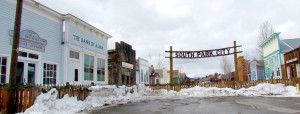By Forrest Whitman
One thing is constant in my small town: bitching about the local economy. I’m accustomed to hearing the same old complaints. Plenty of folks at our coffeehouse call it a permanent recession resulting in low wages with no break in prices. I’ve got a couple of coffee bets out that something new is going to help.
Our economic squeeze is partly due to the local industries. The river rafting companies do hire in the summer, but that’s short term. Our local ski area isn’t a big one. Again, the jobs are not well paid. Walmart is at least consistent, but no source of a big salary. This is an old tale of economic depression told again and again in the small town west.
I’m confident there’s something new on the horizon. It dates back to the Great Depression of the 1930s and the New Deal. This program was originally set up by Franklin D. Roosevelt and the progressive Democrats during the Great Depression. In the 1930s the U. S. Department of Agriculture (USDA) created a way out of the doldrums through rural electrification. A version of that same program is helping out with our local economy in 2015. It really is back to the future.
The Rural Economic Loan and Grant program (REDLG) provides zero interest loans to local utilities which they, in turn, pass through to local businesses for projects that will create and retain employment in rural areas. Even though the Republicans fought the program for years (and may again this budget cycle), it’s working today just as progressive Democrats hoped it would in the 1930s.
One local business in Salida is owned by a successful entrepreneur, Alison K. Brown. Her NAVSIS corporation was started 25 years ago. It specializes in G.P.S. positioning systems and other sophisticated items relating to communication and precise location finding. Nothing could be more state of the art or face more challenges. Even though a device the size of a postage stamp can show you where in the world you are, these systems are constantly in need of change and constantly under fire.
One big challenge is how to protect high tech devices from hostile take over. We depend on cell phones and myriad other communication and location devices, but they can be hijacked. Recent examples of that threat concern a ship and an airplane which got off course. Their navigational systems were taken over by unknown forces. Perhaps more dramatic is the manner in which the North Koreans have destabilized GPS systems and other communication systems for South Koreans.
The USDA program works through member-owned electric co-operatives set up in the 30s. There are many of these electric co-ops in the west and most are eligible for the program. Ms. Brown reminds us that her Salida project couldn’t possibly have started without the no-interest loan. Not many direct jobs will be generated at first. Two will be hired, but more will be added in the next year. This is only part of the good news.
Several small office spaces will be available free in the lower level of the building purchased with the no-interest loan. They’ll be an “incubator” for small business. Everyone around town with an idea for a small business will be able to use the services there. There will be Wi-fi and other support. Many a new small business fails partly because of high overhead costs. Those costs will be zero for the free services in the new “incubator” in the remodeled basement of the old downtown building.
It’s 2015, but a program from 1933 is helping my small town. That’s progressive. The synchronicity between Allison Brown’s company and the USDA really is giving a lift to a town that’s chronically in a recession.
The debate in my coffeehouse is always between progressives like me who think government can help, and those who think government can never work. These days I’ve got a strong example. Rural small towns all across the west can be helped by this venerable and very progressive program. I expect to win my coffee bets on this one.



